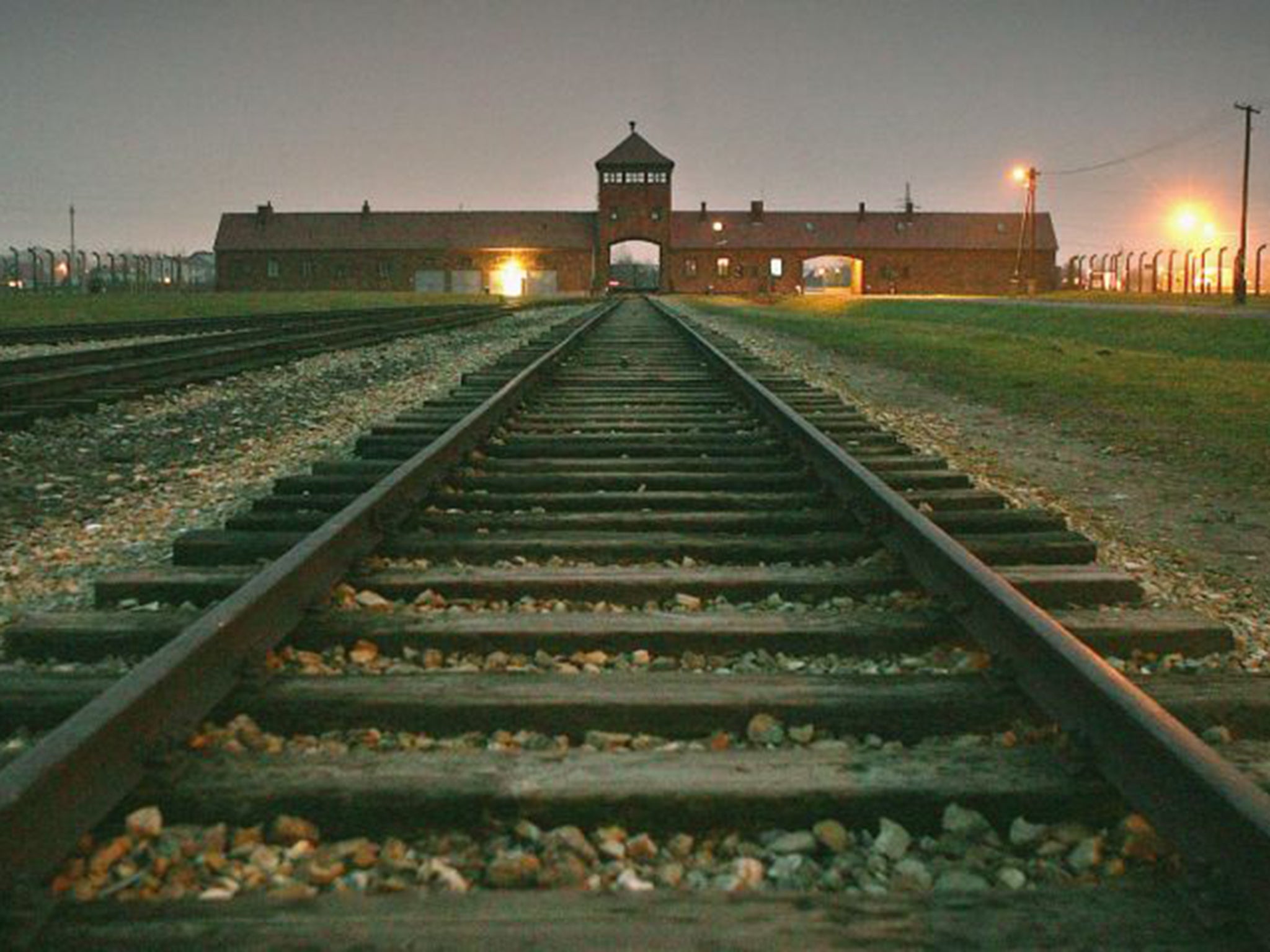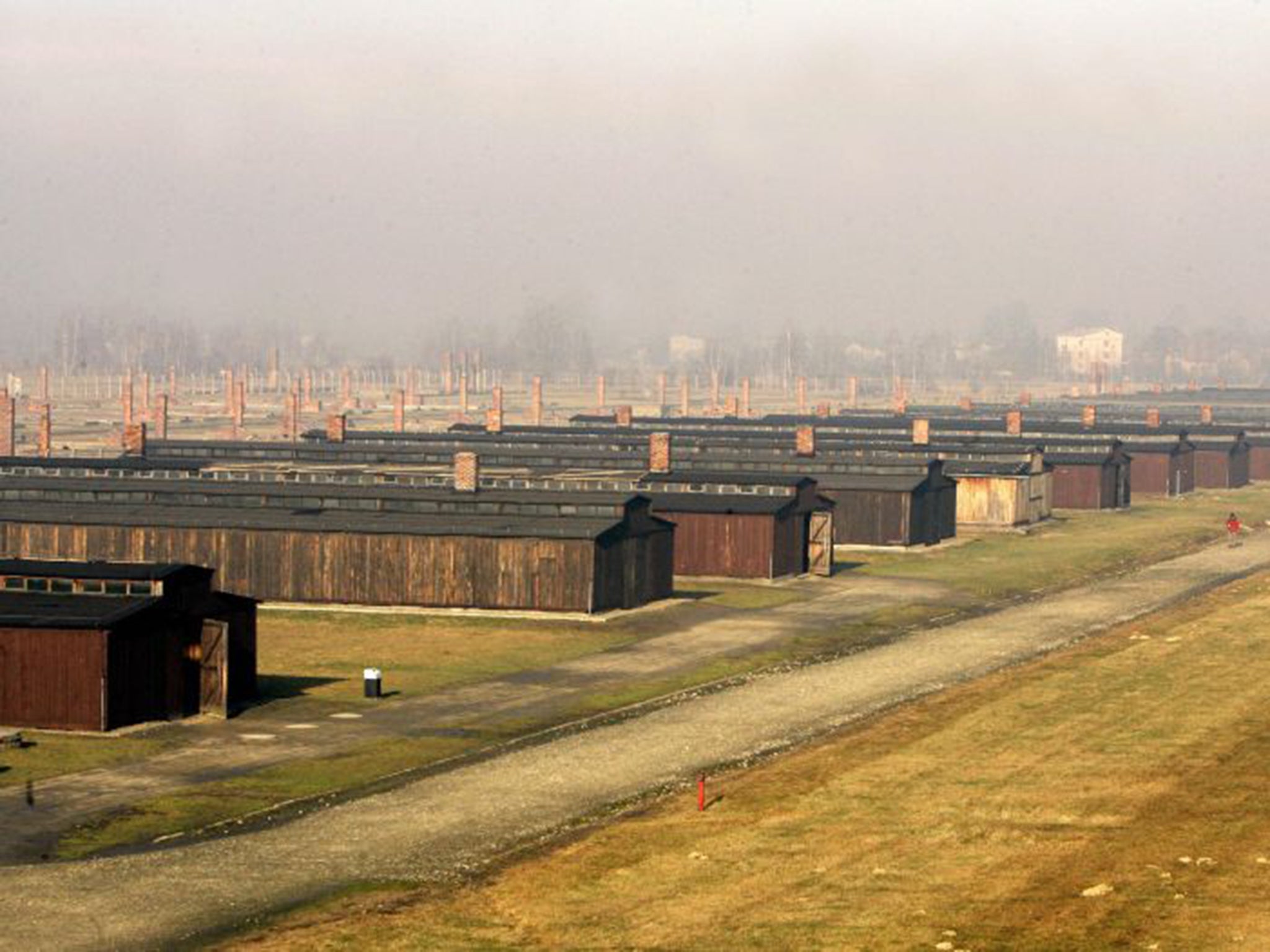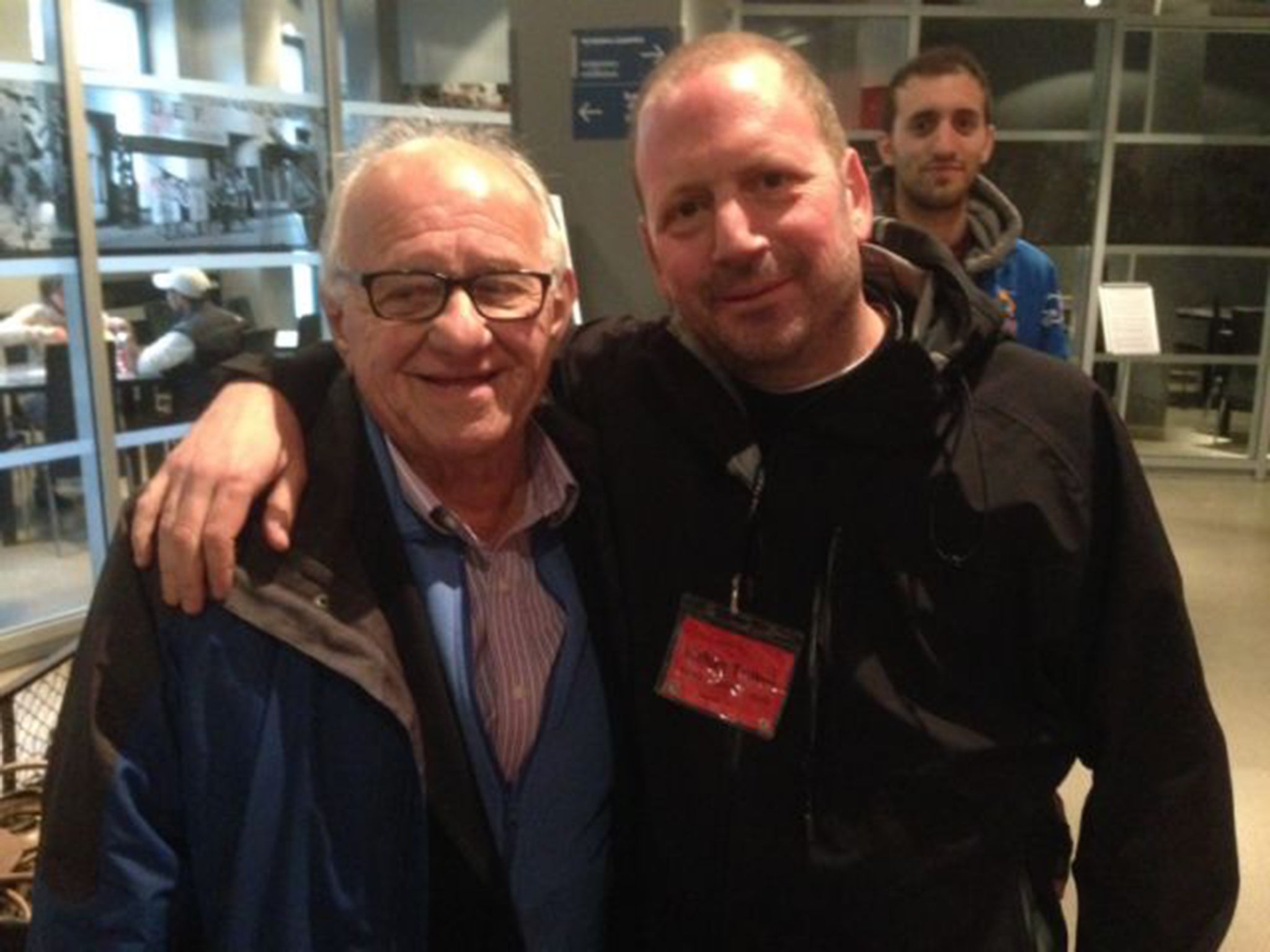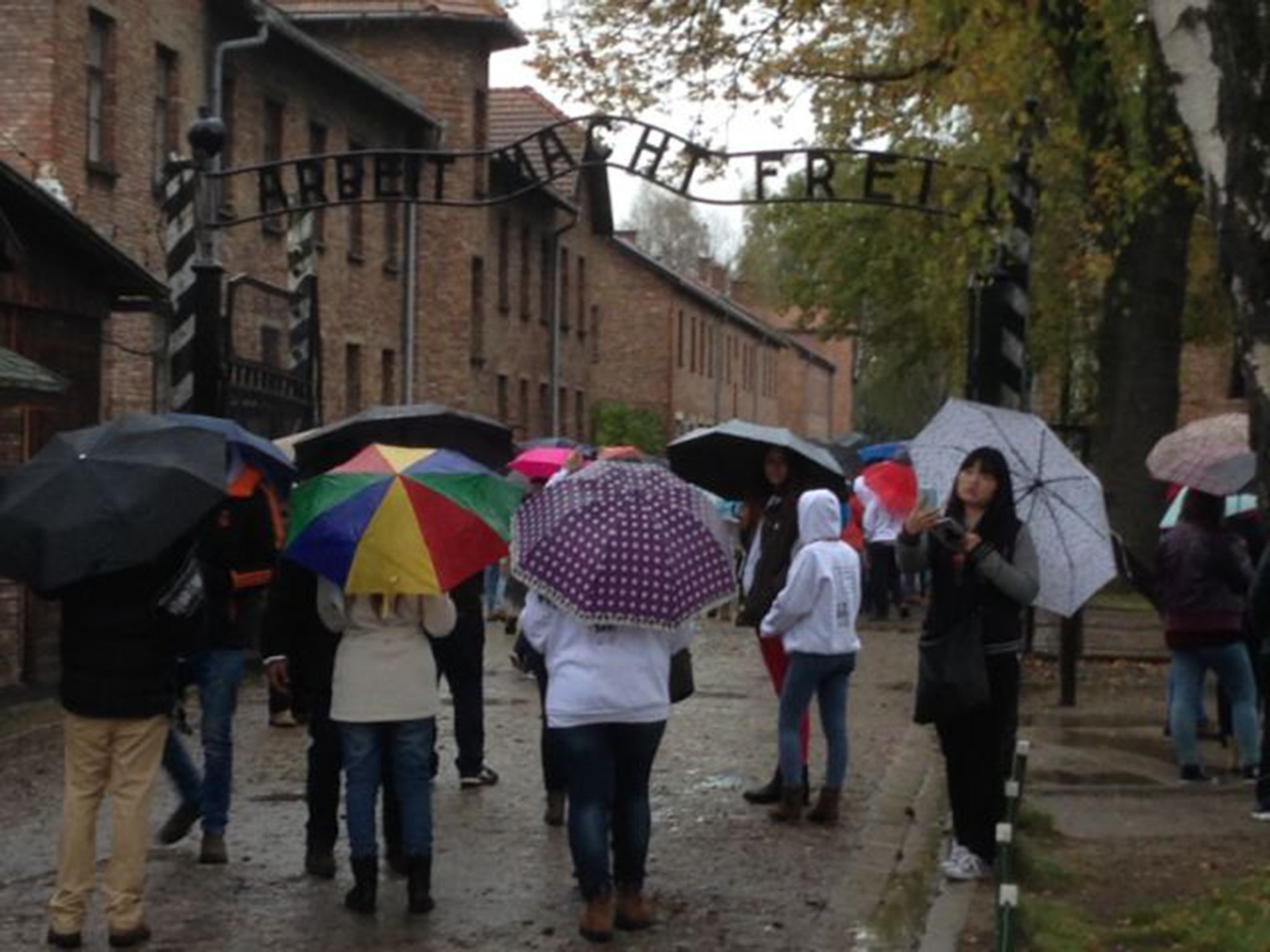70th anniversary of Auschwitz liberation: 'Why I had to visit this monstrous memorial'
Simmy Richman, who had long believed that visits to the concentration camp were little more than macabre tourism, took a journey that he never thought he'd take

Your support helps us to tell the story
From reproductive rights to climate change to Big Tech, The Independent is on the ground when the story is developing. Whether it's investigating the financials of Elon Musk's pro-Trump PAC or producing our latest documentary, 'The A Word', which shines a light on the American women fighting for reproductive rights, we know how important it is to parse out the facts from the messaging.
At such a critical moment in US history, we need reporters on the ground. Your donation allows us to keep sending journalists to speak to both sides of the story.
The Independent is trusted by Americans across the entire political spectrum. And unlike many other quality news outlets, we choose not to lock Americans out of our reporting and analysis with paywalls. We believe quality journalism should be available to everyone, paid for by those who can afford it.
Your support makes all the difference.In the late 1970s, two American television series were shown in the UK. One was called The Holocaust, the other was called Roots. As an impressionable 13-year-old boy living in what was then a predominantly Jewish north London suburb, one of these shows was to have a deep and lasting effect on me. Over the following decades, I would read everything I could lay my hands on related to the subject. From the horrors of the Middle Passage to the bruised optimism of the civil rights movement to the art of the Harlem Renaissance… no aspect of the African-American experience would escape my attention.
Psychologists call this "displacement" (loosely, the redirecting of thoughts and feelings about one subject on to another) and, though I didn't know it back then, I was a classic case. The intended genocide of the Jewish people in the Second World War was too close to home to deal with. How close? My father was born in Frankfurt, his father in a Polish shtetl (small town). The Rajchmans' – my father changed the name just before I was born – eventual escape was a subject we never spoke about, but through whispers and guarded answers to insistent questions, it seems that my grandfather paid his immediate family's way out with the judicious help of diamonds from his gem-cutting business.
According to one version of events, once my grandfather had put his wife and two children on a plane to England, he remained in Frankfurt to tie up some loose ends and was taken to an internment camp and detained until further payments were made. Whatever it is that actually happened back then, it's safe to say that things could have turned out differently for me and my family.
The concentration camps were literally the stuff of childhood nightmares and my younger years were haunted by a succession of what-ifs: what if I had been born a mere 20 years earlier? What if my father had not escaped? What if I had grown up surrounded by some or all of the many Rajchmans left behind?

As I got older and ventured out into the world away from that Jewish suburb, I came to the conclusion that religion was not a pick-and-choose pastime. You were either in it, or you were out. So while I've always strived to be a good person, I have always been a terrible Jew (I was the first Richman, or Rajchman to my knowledge, to "marry out"). Consequently, the idea of ever returning to any of the scenes of the Nazis' crimes never particularly appealed. The very thought of visiting the concentration camps themselves felt positively macabre. I have known many Jewish people who have done this as a rite of passage. But, I reasoned, there are also those who jump at the chance to visit any site of historic evil – Ground Zero, the killing fields of war, the trails of serial killers and so on. Why didn't they just tear Auschwitz down after the war, I would ask whenever the subject came up. Who needs to see such monstrousness in person, and why?
Meantime, when I was about six years old, one of my brothers started dating a girl, Michelle, who is now his wife of some 37 years. Michelle's father quickly became part of our expanding family. I called him "uncle" and have always thought of him as such. I knew, too, that Uncle Ziggy was a "survivor", though he had steadfastly refused to speak of his wartime experiences for some 50 years.
The breakthrough came when Ziggy Shipper was interviewed by the historian Martin Gilbert for a book called The Boys in the mid-1990s. Once he had told his story to Gilbert, it was difficult to stop him and, ever since, Ziggy has been speaking tirelessly on behalf of the Holocaust Education Trust (HET) up and down the country. He has told his story to prime ministers, politicians, schoolchildren and the England football team. His central message is that once you let hate into your heart, it can lead anywhere. When people tell Ziggy, as they do frequently, that he is an "inspiration" for his HET work, he tells them that his wife of 60 years is more of a survivor than he is. In this way he deflects the glare.
A few months ago, I was talking to Ziggy at one family event or another. I don't understand, I said to him, why anyone would want to visit Auschwitz. His response was brief and brooked no argument: "Everybody should."

And so it is that I find myself on a coach trip in Poland – organised with some degree of excellence by a man called Chuni Kahan – to visit the concentration camps of Auschwitz and Birkenau (Auschwitz II). Ziggy is the guest of honour and there are about a dozen members of his family and mine on board. For me, it is an excuse to spend some time with Ziggy (neither of us is getting any younger) but the trip is also a chance to see first-hand whether there might be anything to learn from something I have spent my whole life trying to shut out.
Ziggy has, of course, made this trip more times than he cares to count. He speaks often about the first time he did so with his two daughters: he remembers standing at the end of the train track that leads into Birkenau, at the precise point where the dreaded "selection" processes occurred, looking towards the sky and telling Michelle and her sister Lu that they were the living proof that Hitler did not win.
It is a phrase that has complicated echoes for me. As Jewish kids, we were constantly being told to stick with our own. If you marry non-Jewish partners, parents and teachers would tell you frequently, you would be doing Hitler's work for him. If all Jews were to marry out, Hitler would have won. It is a heavy burden to put on young shoulders. Many carry it around with them for the rest of their lives. Others, myself included, not only reject such responsibility, but actively believe in assimilation – the melting pot, multiculturalism, the mixing up of gene pools. This way, too, surely, blurs Hitler's vision of "racial purity".
The grim horror of the preserved concentration camps is unrelenting. Now a vast "museum", there is much to support my initial reticence to visit (the selfies at the gates aspect of the "tourist" experience, the bizarre selling of items such as a postcard with a picture of empty Zyklon B canisters in the shop etc) and much that offers the opposite view. Throughout, there is an obsession with numbers that serves only to numb. Thousands, hundreds of thousands, millions... Soviets, Poles, Gypsies, homosexuals… The statistics become impossible to digest. The sheer scale of the camps themselves is unimaginable.
Auschwitz and – when that was no longer big enough – its nearby annexe Birkenau, were nothing less than vast murder factories; slaughter on an industrial scale. Those who were permitted to live were largely allowed to do so to keep the factories and surrounding fields manned. Ziggy spent much of the war in the Lodz ghetto, in Poland, but was transported to Birkenau in 1944. "Have you been to see my bedroom?" he jokes at one stage, pointing to one of the grim wooden barracks that were originally horse stables.

There are sights and stories so horrific that the gloom can only be lifted by such attempts at humour. Human beings have a limited vocabulary to describe what they are seeing. Words such as "terrible" and "unbelievable" will be heard many times throughout the day. And the permanent "exhibits" are, of course, unforgettable: the piles of shoes, suitcases and human hair can hardly fail to evoke a response. The mere sight of a barbed-wire fence has stung me ever since.
Finally, in a room near the end of the tour, is The Book of Names, a document painstakingly compiled that aims to preserve the identities of as many of the people killed by the Nazis as is possible. The Book of Names is about the length of a bus and each page is approximately three feet high. I find two pages full of the Rajchmans I will never know.
It is no surprise to be moved by these things but it is left to chance exactly what will get you and when. For me, it is the room with wall-to-wall projections of black and white films of Jewish families going about their day-to-day business before the war. The contrast of these scenes of bustling life against a backdrop of a place like this hits with some force. And though the Nazis were keen not to document the actual gas chambers, there are photographs, from something known as The Auschwitz Album, of people from Hungary and Lodz straight out of the cattlecars, waiting on a grass verge for their turn in the "shower". The look of hope on their faces is devastating.
Could they really not have known what was about to happen? I ask Ziggy what he had thought the giant chimney stacks were for. He tells me that when he stepped off the train and saw them in the distance, he felt relieved that at last he had arrived at a place where they were baking fresh bread. He was 13 years old, starving hungry and hardened by what he had seen. Even he could not begin to imagine…
Outside, I ask a group of German schoolkids what they have made of their own visit. They repeat the now familiar words: "terrible", "unbelievable". I tell them that I am Jewish and ask them how the experience feels to them as Germans. It is the same, they say, wherever you are from. And anyway, many of them want me to know that their families are not originally from Germany.
A few weeks ago, David Cameron made his own way along the same paths we did and talked about his "overwhelming sense of grief". Later this month, Ziggy will be going back once more to commemorate the 70th anniversary of the camps' liberation. As to why Auschwitz and Birkenau have been preserved, well, if you learn nothing else from visiting these places it is that the majority of Polish people want it to be known that while their country undoubtedly had (and has) its share of anti-Semites, the atrocities committed here were nothing to do with them.
In fact, there is a determined effort on the part of many young Poles to celebrate their country's Jewish heritage. There are klezmer (Jewish music) festivals attended almost entirely by Roman Catholics. There is a newly opened Museum of the History of Polish Jews. The Polish government continues to fund the Auschwitz Museum and is determined to keep the visitors coming (in record numbers) to learn about the evils of the Nazi invaders in their country.
And so we come, finally, to the point at which any writer worth their salt would reach a satisfying conclusion on the question of whether or not people should go to see these landmarks of lunacy for themselves. Perhaps, after decades of avoiding the subject as much as is possible, I can finally report that my mind has been changed, my eyes have been opened and that I, too, like Ziggy, now believe that everybody should visit these miserable memorials. I only wish it were that simple…
The 70th anniversary of the liberation of Auschwitz is on 27 January 2015. 'Night Will Fall', a documentary about the liberation, is on Channel 4 later this month, while the BBC has many special programmes to mark the event. Tours are organised by Kahan Travel (kahantravel.co.uk)
Join our commenting forum
Join thought-provoking conversations, follow other Independent readers and see their replies
Comments